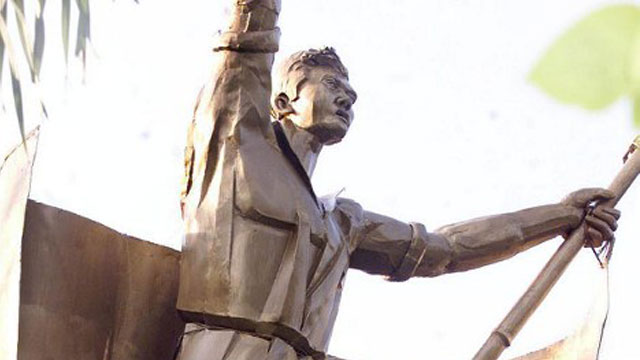SUMMARY
This is AI generated summarization, which may have errors. For context, always refer to the full article.

MANILA, Philippines – Did you know that there is no existing legislation declaring Jose Rizal as the country’s official national hero?
This is a beam of hope for those rooting for Andres Bonifacio, founder of the Kataas-taasang, Kagalang-galang na Katipunan ng mga Anak ng Bayan (KKK), the secret society that led mass revolts against the Spaniards’ abusive rule.
Now they can push for a law that will bestow the title of national hero.
On Friday, November 29, the eve of Bonifacio’s 150th birth anniversary, Bayan Muna representatives Neri Colmenares and Carlos Zarate proposed this through House Bill 3431 or the Andres Bonifacio Act of 2013.
There is a long-standing debate on whether the Father of Philippine Revolution deserves the honor more than Jose Rizal.
HB 3431, once enacted, shall mandate the Department of Education (DepEd) and the Commission on Higher Education (CHED) to “ensure that the life and heroism of Bonifacio is integrated in elementary, secondary, and tertiary curriculum.”
History books must also be updated, and monuments must be erected in all provincial cities and municipal plazas all over the country.
Colmenares and Zarate said there is a difference between what Rizal and Bonifacio contributed to society: the latter had “the ability…to translate Rizal’s writings into a language understandable to the Filipino masses and to transform and develop them into practice.”
It was, they argued, Bonifacio’s “actual participation in the KKK” that “led towards a Filipino nation’s independence.”
Previous bills and the Rizal Law
In July, Kabataan Representative Terry Ridon also filed a bill of a similar name, but it only seeks to institutionalize the inclusion of a course on “the life, works, and ideals of Andres Bonifacio” in the curricula of all high schools, colleges, and universities in the country.
Ridon’s House Bill 1181 is an updated version of 15th Congress’ House Bill 4353, filed by former Kabataan Representative Raymond Palatino, which sought to introduce a similar course only on the collegiate level. The bill did not pass the committee level.
“It is saddening that Congress has not yet held even a single hearing for Bonifacio, even as the nation celebrates his 150th birth anniversary tomorrow. Is this a reflection of how our legislators value Gat Andres? I hope not,” Ridon said in a statement Friday.
HB 1181 is also very much similar to Republic Act 1425 or the Rizal Law, passed in 1956 after much opposition from the Catholic church.
The Rizal Law mandates the inclusion of a course on “the life, works, and writings of Jose Rizal, particularly his novels Noli Me Tangere and El Filibusterismo,” but it was only fully implemented starting 1994, through a memorandum by then President Fidel Ramos.
All the solons who filed these Bonifacio bills belong to the progressive Makabayan bloc.
‘Implied recognition’
The National Commission for Culture and the Arts (NCCA), in an article on its website, confirmed “no law, executive order or proclamation has been enacted or issued officially proclaiming any Filipino historical figure as a national hero,” but added that both Jose Rizal and Andres Bonifacio are given an “implied recognition” as national heroes.
In 1993, Ramos issued Executive Order No. 75 creating the National Heroes Committee (NHC) mandated to study, evaluate, and recommend Filipino national heroes. The technical committee of the NHC listed down the following criteria:
1. Heroes are those who have a concept of nation and thereafter aspire and struggle for the nation’s freedom.
2. Heroes are those who define and contribute to a system or life of freedom and order for a nation.
3. Heroes are those who contribute to the quality of life and destiny of a nation.
4. A hero is part of the people’s expression.
5. A hero thinks of the future, especially the future generations.
6. The choice of a hero involves not only the recounting of an episode or events in history, but of the entire process that made this particular person a hero.
The last 3 criteria were adopted in 1995 by the same committee. In the same year, they selected 9 Filipino historical figures fit to be recommended as national heroes. The list included both Rizal and Bonifacio.
Nothing happened after the NHC submitted their recommendation to the Department of Education, Culture, and Sports. The NCCA enumerated two possible reasons why it has not moved ever since.
“This was probably because this might trigger a flood of requests for proclamations. Another possibility is that the proclamations can trigger bitter debates involving historical controversies about the heroes,” the commission said.
Celebrations for Bonifacio’s 150th birth anniversary started in February this year, but more than a year-long remembrance, his sesquicentennial became a platform for groups who clamored for the government to formally recognize the hero.
Aside from pushing for a national hero status for Bonifacio, an organization wants Bonifacio recognized as the first president of the Philippines. Still, others are urging the Aquino government to give Bonifacio a state funeral. (READ: His Excellency, President Andres Bonifacio?) – Rappler.com
Add a comment
How does this make you feel?
There are no comments yet. Add your comment to start the conversation.